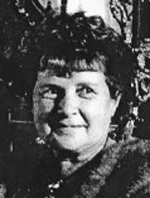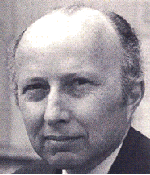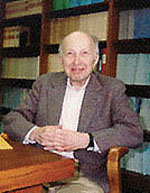Tales of Statisticians
William Kruskal
10 Oct 1919 (New York City) - 21 April 2005 (Chicago)William Kruskal has his own highly quotable definition of statistics:
"Each of us has been doing statistics all his life, in the sense that each of us has been busily reaching conclusions based on empirical observations ever since birth" (Statistics, Moliére, and Henry Adams).
Like his contemporary Frederick Mosteller, Kruskal was an early statesman of statistics, and an advocate of statistics in public policy; the two men even collaborated with some of the same people. He himself started out as the oldest of the three sons (and two daughters) of Joseph Kruskal, the owner of the nation's largest wholesale fur business. He attended Antioch and Harvard, graduating from the latter in 1940 and receiving a Master's degree in mathematics in 1941. The war was on, and Kruskal immediately went to work as a mathematician at the U S Naval Proving Ground in Dahlgren, Virginia. He left in 1946, worked at his father's firm until 1948, and then received a lectureship at Columbia in 1949-1950. In 1950 he went to Chicago as an instructor in statistics, and spent the rest of his career there.
1950 was a family watershed in another way as well: in that year Joseph Kruskal died. Lillian Kruskal married Harry Oppenheimer in 1952, and gradually developed a previous geometrical interest of her own: Japanese paper folding. Her work was picked up by the newspapers in 1958, and in 1962 appeared her book Folding Paper Puppets. She is credited with making the word "origami" familiar in the West.
Her son William's most visible contribution to statistics was made in this same period. It is the Kruskal-Wallis test (1960), a rank order substitute (generalizing the Wilcoxon rank sum test) for the one-way analysis of variance of k groups. It has become a standard part of the statistical toolkit.
Kruskal was editor of the International Encyclopedia of the Social Sciences from 1962 to 1968, and himself contributed to its statistical entries. But as Judith Tanur was later to say of him, "he was interested in everything," and In 1964 his paper on Statistics, Moliere, and Henry Adams appeared in The American Scientist. Institutionally, Kruskal was a co-founder of Chicago's Department of Statistics, which he headed from 1966 to to 1973. Nationally, he was appointed by President Nixon to the Commission on Federal statistics in 1970, whose mission was to review the compilation and use of statistics by the Federal government. He also did much to survey and unify statistical practice across different academic fields, as in the edited volume Mathematical Sciences and Social Sciences (1970). He became President of the Institute of Mathematical Statistics in 1971, and, in the same year he was appointed the first chairman of the National Research Council's Committee on National Statistics, a position he held until 1978. Kruskal was named the Ernest Burton DeWitt Professor of Statistics in 1973; he served as Dean of Social Sciences at Chicago between 1974 and 1984, and as President of the American Statistical Association in 1982. During this period, the statistics entries were gathered from the International Encyclopedia of the Social Sciences and issued separately, with Judith Tanur as co-editor, as International Encyclopedia of Statistics in 1978. Kruskal's series of papers with Chicago colleague Leo Goodman, on measuring the association between a pair of attributes, also has classic status; their book Measures of Association for Cross Classifications appeared in 1979. Kruskal's coordinate-free approach to linear statistical methods is an innovation in viewpoint that has been compared to Einstein's discovery of the relativity of frames of reference in physical measurements.
Kruskal's interests in psychology and public policy applications overlapped with those of Fred Mosteller, and their joint papers on representative sampling (1979-80) are authoritative for that subject. Later came "Miracles and Statistics: The Casual Assumption of Independence" (1988).
In that same year, he served as Interim Dean of the newly established Irving B Harris Graduate School of Public Policy Studies from 1988 to 1989. He retired from Chicago in 1990.
As an Emeritus member of the Chicago statistics department, Kruskal described his current research interests in this way:
"Statistics and Public Policy. Work on a variety of problems on the boundary between theoretical statistics and public policy: census underenumeration, confidentiality, evaluation procedures, etc."
"History of Statistics. Currently have several historical projects in hand. One, for example, deals with concepts of normality in statistics, medicine and elsewhere."
"Relative importance. Investigators often wish to describe the relative importance of two or more inputs to some kind of output (eg, family background, school funding, and hours of study as they affect academic achievement; pressure, temperature, and total time as they affect an industrial process). Typically, ad hoc ways of measuring relative importance are used, and I would like to understand these measures at a more basic level."
William Kruskal died of pneumonia on Thursday, 21 April 2005, in the Bernard Mitchell Hospital in Chicago, at the age of 85. He was one of the architects of American statistics as it exists today, and contributed important techniques to its toolkit. Both contributions are permanent.
Statistics is Copyright © 2001- by E Bruce Brooks
4 Sept 2004 / Contact The Project / Exit to Statistics Page


